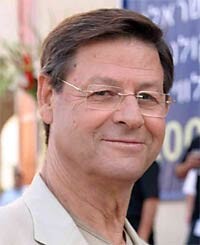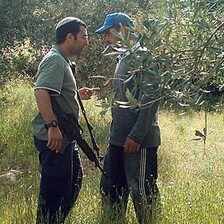Palestine Report 9 June 2005
For nearly 40 years, Israelis have known Haim Yavin’s face. Now they also know his opinions. Whether that is leading to any deeper understanding of his message about the functioning of the Israeli media is less certain.
“Since 1967, we have been brutal conquerors, occupiers suppressing another people.” It is in such terms Yavin has been expressing his disgust for the Israeli occupation in the five-week series of reports “A Land of Settlers” currently being broadcast on Israeli Channel Two.

Haim Yavin
Yavin is not Gideon Levy or Amira Hass, Haaretz journalists long classified as left-wingers and outspoken critics of the occupation. In the June 4 edition of Haaretz, Levy described Yavin as “a Zionist to the depths of his soul, the paragon of consensus.” From every corner of the political spectrum, people used to, somehow, identify with Yavin, as he represented neutrality par excellence. Thus, hearing such views expressed from Yavin is “much more jarring” than from anybody else, says Levy.
Hear no evil, see no evil, speak no evil
“Where were he and his colleagues, the television broadcasters … while the outrage was created - the nightmare that Yavin is now discovering,” Levy asked in an interview with the Palestine Report.
“By criticizing the occupation, Yavin took one step to save his dignity. As a former director of Israel Television and the head of its news department he was part of a system that is hiding the truth about the territories from the Israeli public.”
According to Levy, in Israel there is a sort of unspoken collusion by which journalists don’t want to write, editors don’t want to publish and the public doesn’t want to read about the situation in the occupied territories.
“In Israel there is strong self-censorship on behalf of the media, which is much more dangerous than any government or military censorship.” Israeli journalists, says Levy, have a relatively large freedom of expression but consciously choose not to cover some important issues.
For Daniel Dor, professor at Tel Aviv University’s Department of Communication and Social Sciences, “choosing not to cover an issue that is recognized by many as an important topic is actually making a very strong statement on what is our collective identity. This is exactly the case when the Israeli media decides not to cover the issue of the wall, though all the European media are focused on it.”
Dor suggests that the media, along with patriotism and military service, is a strong component of the collective Israeli identity. Though “brainwashed”, in Dor’s opinion, is too strong a term to characterize this identity, the Israeli public does not have access to the full picture. Levy goes further in his analysis of the misinformation prevalent in Israeli society, saying Israelis are habitually fed “half-truths and sometimes even lies. European citizens know better what is happening in the Palestinian territories than most Israelis who live only a few kilometres away.”
Dor’s research points to the presence of a triangular mechanism of systematic reinterpretation of events in the Israeli media. First, the amount of information about the Palestinian territories available to the Israeli public is scant. Second, the dominant Israeli narrative reframes this information according to the conventional Israeli collective identity. Finally, “there is, in Israel, an acute sense of being blamed by the whole world for whatever is happening in this part of the world,” says Dor. “We, Israelis, think the whole world is blaming us for something that never happened. And it never happened because we didn’t receive any information about it. And we didn’t receive any information about it because if something sounds different from the mainstream Israeli narrative, then it is immediately reframed.”
Barak’s lies
This kind of misinformation reached a climax some five years ago. Dor and Levy both finger “Barak’s lies” about Camp David as the trigger for a state of affairs that has been perpetuated ever since. When the former Israeli prime minister came back from Camp David with no agreement and blamed that entirely on the Palestinian camp, saying there was “no partner for peace”, it had a tremendous effect on Israeli public opinion. Both the left and right complied with this view, and as a result the peace camp virtually disappeared as it was no longer able to propose any alternative to the rightist view on the Palestinians.
“Since that time the Palestinians have been constantly suffering and their agony has had no echo in the Israeli media”, says Levy. “On the Israeli side, the media only shows the suffering of its own people, ignoring the roots of terror, which is the Israeli occupation. For this [state of affairs], every Israeli citizen is responsible as these actions are taken in their name.”
After many years in the media, Haim Yavin decided to assume this responsibility and see for himself what was happening in the land next to him. For two-and-a-half years he travelled through Palestinian cities and Israeli settlements with his private hand-held camera. Though not a dovish left-winger, “what he saw profoundly changed him,” says Levy. In his series of reports, Yavin explains that the least he could do to fight the occupation “was to document it”.
“This time, Yavin fulfilled his mission not only to tell the truth, but to tell the whole truth… and he did not hesitate to jeopardize his statesmanlike status and the widespread popularity he has enjoyed for years”, Levy wrote in Haaretz.
For documenting his view on the occupation, Yavin has been vigorously criticized by Benzi Lieberman, leader of the Yesha (settlers’) Council. The latter has demanded that the news anchor be dismissed as, according to his view, Yavin can not be objective anymore.
“Haim Yavin’s credibility as a news anchor is not at all questioned in this affair. The settlers are doing their usual manipulation. They are attacking him personally to avoid dealing with the issues he raises”, says Levy. “It is extremely doubtful that Yavin is powerful enough to bring an end to the settlement enterprise, but the message that emerges from the series has already stirred more public debate than any other television program in a long time.”
No wind of change
That Yavin’s program has stirred debate within Israeli society may be seen as progress in itself but according to Dor, the controversy is far from a sweeping wind of change in the Israeli media and society. Referring to the past few years, he points out that “it is not the first time that a personality representing the general Israeli consensus expresses sudden criticism of the Israeli occupation”. As an example, he points to the refusal of the highly-esteemed Israeli air force fighter pilots to serve in the occupied territories.
“The most important element is what the public does with such a strong criticism of the Israeli machine. Yavin’s reports will not change the audience’s perception of the conflict but only their perception of Haim Yavin as a person. Now they know he is a leftist and this is where the public discussion stops.”
“A Land of Settlers”, says Dor, though a five week series, cannot document the complex issues of the Israeli occupation and the media’s ignorance of the Palestinians’ lives. Dor projects that Israeli media obliviousness will only diminish “when people ‘up there’, like the Prime Minister, decide to make peace with the Palestinians and then adopt another kind of narrative”.
On a similarly pessimistic tone, Levy argues that as long the Israeli media continues avoiding covering what he says is the main cause of terror, the Israeli occupation, chances are that terror will start again because the plight of the Palestinians hasn’t improved.
“Before anything changes in the Israeli media’s coverage of the territories, we will have to go through much more blood and many more lies.”

Related Links



